- 協会TOP
- 通信講座
- コラム
- 連載 柳瀬和明先生の「1日の生活を英語で表現してみよう!」
- 第2回 家を出てから職場まで
COLUMNS
コラム
連載 柳瀬和明先生の「1日の生活を英語で表現してみよう!」
第2回 家を出てから職場まで
今回は「家を出てから職場まで」の出勤途中の場面を取り上げて、さまざまな行動・心情・描写の表現を広げていきましょう。
1
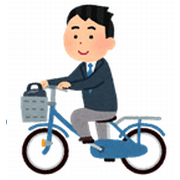
・駅まで自転車で行く。 I go to the station by bicycle.
・ 気持ちのいい風だ! It’s a nice breeze!
気持ちのいい風だ! It’s a nice breeze!
・ 上り坂はきついなぁ。 It’s hard to go up slopes.
上り坂はきついなぁ。 It’s hard to go up slopes.
・約15分かかる。 It takes me about fifteen minutes.
【ここに注意!】
・by+乗り物名:byの後はa/theをつけません。 例:by car [bus / taxi]
「徒歩で」の場合は、walk to 「~へ歩いて行く」を使います。
・It takes (人) +時間:(人に)時間がかかる
It takes me about one hour to go to the office. 会社に行くのに約1時間かかる。
・bicycleは、会話ではしばしばbikeと言います。日本語の「バイク」はmotorcycleまたはmotorbikeです。
【関連表現】
・たくさんの人が電動自転車に乗っている。 Many people ride electric bicycles.
・電動自転車は高い。 Electric bicycles are expensive.
2
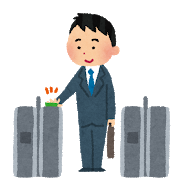
・改札口を通る。 I go through the ticket gate.
・ 自動改札は便利だ。 Automatic ticket gates are convenient.
自動改札は便利だ。 Automatic ticket gates are convenient.
・ あっ、定期が昨日で切れてた。 Oh, my train pass expired yesterday.
あっ、定期が昨日で切れてた。 Oh, my train pass expired yesterday.
・エスカレーターが設置工事中だ。 An escalator is being built.
【ここに注意!】
・expire:(免許証、定期券などの)有効期限が切れる
・be動詞+being+過去分詞:~されているところだ
(be動詞+…ingで進行形を作り、be(ing)+過去分詞で受け身を作っている形)
【関連表現】
・券売機はどこだろう。 Where is the ticket (vending) machine?
・クレジットカードで切符を買う。 I buy a ticket with my credit card.
3
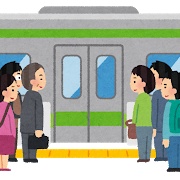
・電車を待つ。 I wait for the train.
・ あっ、電車がくる。 Oh, the train is coming.
あっ、電車がくる。 Oh, the train is coming.
・ ラッシュアワーのピークだ! It’s peak rush hour!
ラッシュアワーのピークだ! It’s peak rush hour!
・事故のため、電車が遅れている。 The train is delayed because of an accident.
【ここに注意!】
・is [are] delayed:(何かが原因で)遅れている *英語では、受け身 [be動詞+過去分詞] の形で表します。
・because of …:…のため、が原因で
【関連表現】
・電車に乗る/を降りる。 I get on/off the train.
・電車がぎゅうぎゅう詰めだ。 The train is packed.
4
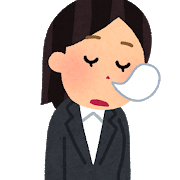
・車内で眠ってしまう。 I fall asleep on the train.
・ ちょうど降りる駅だ! This is my station!
ちょうど降りる駅だ! This is my station!
・ あーあ、乗り越しちゃった。 Oh no, I missed my station.
あーあ、乗り越しちゃった。 Oh no, I missed my station.
・多くの乗客がスマホを使っている。 Many passengers are using their smartphones.
【ここに注意!】
・fall asleepは、しばしば「意図せずに」という意味が含まれます。
例:I fell asleep during the meeting. 会議中にうっかり寝てしまった。
・my stationで、「私の利用する駅」という意味になります。
【関連表現】
・スマホで音楽を聴く。 I listen to music on my smartphone.
・スマホでゲームをする。 I play a game on my smartphone.
5
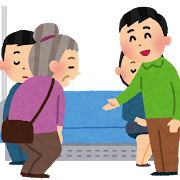
・お年寄りに席を譲る。 I give my seat to an elderly person.
・ いいことをしたな。 I did the right thing.
いいことをしたな。 I did the right thing.
・ 正直なところ、座りたかった。 To be honest, I wanted to sit down.
正直なところ、座りたかった。 To be honest, I wanted to sit down.
・若者が優先席に座っている。 A young person is sitting in a priority seat.
【ここに注意!】
・do the right thing:「正しい(当然の)ことをする、適切な行動をする」という意味です。
・To be honest:正直な気持ちを伝えるときの表現で、しばしば文頭で使います。
【関連表現】
・盲導犬を連れた乗客がいる。 There is a passenger with a guide dog.
・盲導犬はとても賢い。 Guide dogs are very smart.
*英語のsmartには、「体形がすらっとした」という意味はありません。
6
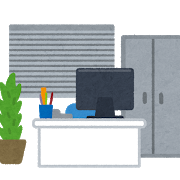
・職場に着く。 I get to the office.
・ 会社のセキュリティーがよい。 Our company's security is good.
会社のセキュリティーがよい。 Our company's security is good.
・ 今日はとても忙しくなりそうだ。 It’ll be very busy today.
今日はとても忙しくなりそうだ。 It’ll be very busy today.
・入口に監視カメラがある。 There is a security camera at the entrance.
【ここに注意!】
・「~に着く」は、get to、arrive at、reachがあり、reachはget toやarrive atよりも堅い表現です。
【関連表現】
・身分証明書を見せる。 I show my ID card
・身分証明書を紛失した。 I lost my ID card.
<あなたの出勤途中は?>
上記以外で、出勤途中はどのようなことをしていますか。よく行うことを書いてみましょう。また、スピーキングでも使えるように発音してみましょう。
●行動表現:
・
●心情表現:
・
・
●描写表現:
・
<今日の出勤途中を振り返る> 動詞の過去形を使って表現してみよう。
複数の文(行動・心情・描写)をつなげて、今日の出勤途中を振り返ってみましょう。【ヒント】にあるような接続詞を使うと、細切れの文にならずに、流れのある文章になります。
【ヒント】
after ...:…した後で、 after that:その後で、 and ...:そして… but ...:しかし…
..., so ~:…なので、~ when ...:…したとき、 while ...:…している間
【例】
I went to the station by bicycle. It took me about fifteen minutes. At the station, the train was delayed because of an accident. The train was packed, so I was very tired when I got to the office.
(was very tired:とても疲れた)
【チャレンジ!】
あなたの今日の出勤途中のことを書いてみましょう。
柳瀬和明(やなせ かずあき)氏
上智大学外国語学部英語学科卒。オーストラリアの各種教育機関で日本語教育に従事し、都立高校での英語教員を経て、現在も英語教育に関わる分野で活躍中。


